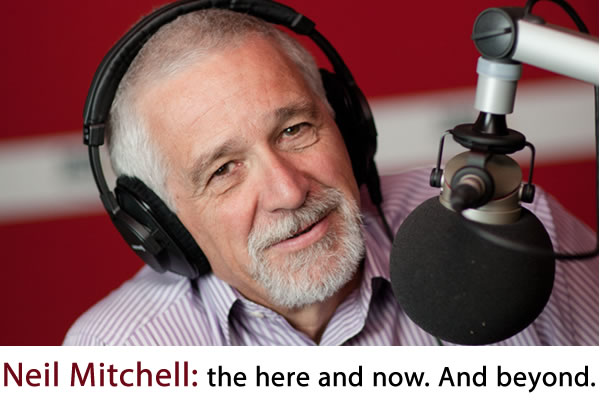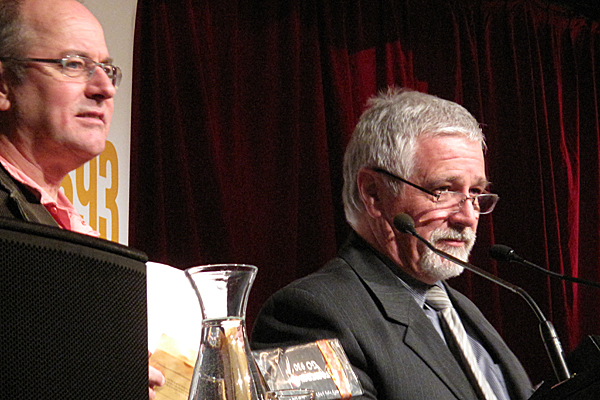Neil Mitchell: the here and now. And beyond.

Neil Mitchell is in contract negotiations to extend his time at Melbourne’s 3AW. He hates the discussions, but loves the job.
It’s also put him in a reflective mood as he talks ‘all things’ radio and journalism with Radio Today’s Nikole Gunn.
In part two of their chat, Mitchell discusses his passion to continue, the rise of Social Media and the future of talk radio.
Nikole: You’ve been doing this for a few years now and things have changed. What lies ahead for you?
Neil: Well, I can’t do it forever, but I still enjoy it and I want to keep doing it. I’m in contract negotiations at the moment, which I hate. I have a think at the end of every contract: will I go do something else? A little bit of newspaper. A little bit of TV. A little bit of radio.
But then I think: ‘geez, how do you give it up’? I’m going to have to at some point, eventually. But not yet. Not as long as I’m enjoying it and I can get reasonable figures. If the figures crash, then there’ll be a tap on the shoulder anyway.
There used to be a theory that the longer you were around, the safer your figures would be. I don’t believe that.
Nikole: Maybe 10 years ago. It’s a bit more fickle these days..
 Neil: And you never know what the competitors are going to do. FM re-configuring itself over the next year – that could affect us, obviously. I mean, we had Hamish and Andy against us for an hour for a while and we survived that, but when they start fiddling in drive that could flow through.
Neil: And you never know what the competitors are going to do. FM re-configuring itself over the next year – that could affect us, obviously. I mean, we had Hamish and Andy against us for an hour for a while and we survived that, but when they start fiddling in drive that could flow through.
The departure of Hinch here affected all of us, which Derryn would be very .jpg) pleased about (laughs). There’s a challenge to the figures all the time, so I don’t take them for granted. As long as I’m rating, I’m enjoying it and I’m able to health wise, then I’ll stick around. If any of those things go, then…
pleased about (laughs). There’s a challenge to the figures all the time, so I don’t take them for granted. As long as I’m rating, I’m enjoying it and I’m able to health wise, then I’ll stick around. If any of those things go, then…
I’d like to be able to back off a bit in terms of the hours I work, but I don’t think I can. It’s not me. I’d like to be able to come in later and go earlier, but I don’t think that’s going to happen.
Nikole: But could you? Could you physically make yourself? I mean, it’s addictive isn’t it?
Neil: It IS addictive. But I could do with a later start and an earlier finish. I’m usually in bed by 8.30 and that’s a pain in the neck. (laughs)
 Nikole: There’s all the talk that the “Golden Age of radio” was back in the 50s, 60s and 70s and we’re now seeing the ‘death’ of radio, especially talk radio.
Nikole: There’s all the talk that the “Golden Age of radio” was back in the 50s, 60s and 70s and we’re now seeing the ‘death’ of radio, especially talk radio.
Neil: It interests me when people talk about the “Golden Age of radio”. Someone once told me that the “golden days of 3AW were with Norm Banks”. But Ross Stevens and I have, between us, been number one for the past 20 years.
Ross has changed talk radio in this town immensely. We’ve changed all changed. We’ve come off the pedestal and we’re treating it as a form of raw journalism.
Nikole: Pew Research in the US looked at the rise of Social Media, and found that traditional platforms like radio and remain strong and vibrant.
Neil: Nobody else can get that direct ‘person-to-person’ contact that you can get on talk radio. You can be blogging in real-time, but you still haven’t got that ‘person-to-person’ contact. Talk radio has that, which I think is good not only for those that call in, but also for the audience to hear.
I’ve been here since mobile phones started and to see their use grow, and add to the programs, is amazing. I mean we’ve got a hundred thousand “reporters” out there and a large percentage of them will call in if they see something. They won’t call just to have a chat or argument, but if they see something that they think is dramatic, they’ll ring and tell you. And that’s superb.
 Nikole: It’s the rise of Citizen Journalism, isn’t it? Everyone has access and the ability to report.
Nikole: It’s the rise of Citizen Journalism, isn’t it? Everyone has access and the ability to report.
Neil: Yeah, that’s right. And radio is the only one that does it really well. I did it for a while on TV, with very little success. I still think it can work on TV.
There’s a lot of adjustment to be made. We’ve got to make a philosophical change to the way we view things and the way we do things will have to change still because of the different news platforms and the different news cycle.
I sense that as an industry, we’re losing losing touch with just what the audience wants us for or needs us for. It’s changing. We’ve got this massive opportunity, because we still do something that no one else does. We’ve got to exploit it. As individual radio stations, and as an industry, we have to focus on where we are going.
Neil Mitchell has had a long and illustrious career in print journalism and in radio. In part 3 on Monday, Mitchell has some very strong views on the influence of the media and offers advice to young journalists.


